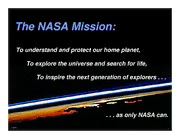
NASA Technical Reports Server (NTRS) 20050217151: Future Directions for Space Transportation and Propulsion at NASA PDF
Preview NASA Technical Reports Server (NTRS) 20050217151: Future Directions for Space Transportation and Propulsion at NASA
Future Directions for Space Transportation and Propulsion at NASA 5th International Symposium on Liquid Space Propulsion Long-Life Combustion Devices Technology Chattanooga, TN October 27-30, 2003 Robert L. Sackheim Assistant Director and Chief Engineer for Propulsion NASA Marshall Space Flight Center RLS0011 0 The NASA Mission: The NASA Mission: To understand and protect our home planet, To explore the universe and search for life, To inspire the next generation of explorers . . . . . . as only NASA can. RRLLSS00001111 11 SSppaaccee IIss CCrriittiiccaall ttoo tthhee WWoorrlldd TThhee NNeeww IInntteerrnnaattiioonnaall ““OOcceeaann”” ♦♦ SScciieennttiiffiicc DDiissccoovveerryy –– TThhee SSeeaarrcchh ffoorr LLiiffee BBeeyyoonndd EEaarrtthh –– UUnnddeerrssttaannddiinngg oouurr PPllaanneett –– UUnnddeerrssttaannddiinngg oouurr UUnniivveerrssee –– EExxpplloorraattiioonn ooff tthhee PPllaanneettss aanndd BBeeyyoonndd ♦♦ TThhee UUllttiimmaattee HHiigghh GGrroouunndd ffoorr NNaattiioonnaall SSeeccuurriittyy –– IInntteelllliiggeennccee,, CCoommmmuunniiccaattiioonnss,, RRaappiidd RReessppoonnssee,, GGPPSS .. .. .. WWoorrlldd WWiiddee ♦♦ ““SSppaaccee--BBaasseedd”” CCoommmmeerrccee –– CCoommmmuunniiccaattiioonnss aanndd EEaarrtthh OObbsseerrvviinngg YYeett iitt RReemmaaiinnss tthhee LLaasstt,, LLaarrggeellyy UUnnttaappppeedd FFrroonnttiieerr RLS0011 2 MSFC’s Heritage – Complex Programs Requiring a Strong Systems Engineering Focus RLS0011 3 RRLLSS00001111 44 Stepping Stones Overlay on Space Transportation Regimes Robotic, near Sun R4 Human, Inner Planets Civil Robotic, R5 LEO to Inner Planets Human, Human, R2 Outer Planets HEO to R7 Lunar Human R3 LEO R1 Robotic, Outer Planets R6 Robotic, Beyond Planets R8 RLS0011 5 Regime Descriptors and Needs R1 Human Earth ISS and other near-Earth Frequent access; safety; medium Orbit missions cargo; reduced cost R2 Robotic LEO to Earth & space observation; State of art mainly OK; reduced cost; near planets planetary science; sample higher reliability; landing & ascent return systems R3 Human HEO and Missions in cislunar space Medium space transfer/cargo, lunar & lunar surface and basing landing, safety, reduced cost R4 Robotic near-Sun Mercury, solar probes, High delta V, reduced cost, ETO solar polar state of art OK R5 Human near Mars and Mars surface, Increased lift to LEO, heavy space planets asteroids, exploration and transfer, short trip time, reduced basing cost, safety, artificial g R6 Robotic outer Orbiters, probes, landers, Reduced trip time, high/very high planets sample return delta V, nuclear electric power, reduced cost, ETO state of art OK R7 Human outer To Jupiter and Saturn Fast trips, very high delta V, heavy planets moons, landing, return space transfer, nuclear power R8 Robotic beyond Kuiper belt, Oort cloud, Very/extremely high delta V, nuclear planetary system interstellar medium electric power RLS0011 6 End-to-End Regimes Capture Mission Requirements Equal emphasis over all Regimes favors NASA-Wide Propulsion Requirements R5 RR77 R1 R2 R3 R4 RR66 RR88 In-Space Transportation Cross-cutting Technologies Return ETO Some Regimes have Earth Return Earth RLS0011 7 Office of the Space Architect Work Breakdown Structure Space Architect 1.0 2.0 5.0 3.0 4.0 Management Architecture Special Studies Transportation CRAI & Integration Studies and Leveraging • Policy & Governance • Management Integration & •Management Integration • Management Integration & • Management • Systems Engineering Administration & Administration Administration Integration & • Integrated Space Plan • Architecture Options • ISTP •Integrated Roadmaps Administration • Annual SA Program • Reference Missions • ISP Support •Capability/need •Leveraged Studies Formulation • Capability/needs • CRAI Support Identification • Architecture Study Direction Identification • Architecture Support •Capability/need analysis & • Integrated Reference • Leveraged Studies • Special Studies Assessment Architectures • ISP Support • Leveraged Studies •Gap Analysis • New Initiative Evaluations • CRAI Support • Investment Strategies • Current Program Evaluations • System Support • ISP Support • SA Board Recommendations • Architecture Support • Communications • System Support Strategy • Leveraged programs RLS0011 8 Integrated Space Transportation Architecture Inputs to the Space Architecture Work Breakdown Structure Format 1.0 Space Architect - Gary Martin, Headquarters 2.0 Integrated Space Transportation Architecture (ISTA) 3.0 MSFC POC/Bob Sackheim Inputs to/from CRAI Team 3.1 3.2 3.3 3.4 3.5 3.6 ETO/ISTP Baseline Enabling In-space Planetary In-space Special Research Propulsion Operations Infrastructure Studies 3.1.1 Shuttle (SSP) 3.2.1 Applied Research 3.3.1 Conventional 3.4.1 Aero Assist 3.5.1 ISRU 3.6.1 Special • RTF • Better Nozzles, etc. Functions • Aero Braking 3.5.2 Fluid/Propellant Architecture Studies • Sustained Operations 3.2.2 Fundamental Research 3.3.1.1 Orbit Transfer • Aero Capture Depots 3.6.2 Special Study • SLEP • Antimatter 3.3.1.2 AVCS 3.4.2 Entry Descent 3.5.3 In-Space Fluid Support 3.1.2 NGLT • Advanced Nuclear, etc. 3.3.1.3 Pointing & Landing (EDL) Transfer Systems 3.6.3 Humans Beyond 3.3.1.4 NSSK • ORSC Engine 3.4.3 Ascent Vehicles ISS 3.3.1.5 EWSK • Green RCS/OMS • Advanced Avionics 3.3.1.6 Orbit Adjust 3.6.4 Stations at • Thermal Protect Systm 3.3.1.7 Drag Make-up Lagrange L-1/L-2 Moon/Sun • Structure 3.3.2 Non-conventional • Tanks Approach 3.6.5 Studies/Analysis • Upgraded Liquid Oxygen 3.3.2.1 Sails tools, e.g. ISEAP • Liquid Hydrogen (Cobra Type) 3.3.2.2 Tethers • (LH TCA) 3.3.2.3 Aero Assist Tech 2 • IVHM 3.3.3 Orbiter Vehicle In- • Hypersonics/NAI, CCEs Space Control Functions 3.1.3 OSP 3.3.3.1 OMS & RCS • Capsule • Winged/Aero 3.3.4 Nuclear Propulsion • Lifted Body/Aero MMRPS/RTG/RPS 3.1.4 ELVs • Small Launchers (SELV’s) REP • Existing ELV’s NEP • HLLVs Nuclear Power /EP/NTR/Converter Technology RLS0011 9
